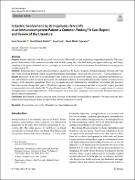| dc.contributor.author | Pecorella, Irene | |
| dc.contributor.author | Okello, Tom Richard | |
| dc.contributor.author | Ciardi, Gaia | |
| dc.contributor.author | Ogwang, David Martin | |
| dc.date.accessioned | 2021-06-24T06:49:02Z | |
| dc.date.available | 2021-06-24T06:49:02Z | |
| dc.date.issued | 2021 | |
| dc.identifier.citation | Pecorella, I., Okello, T. R., Ciardi, G., & Ogwang, D. M. (2021). Is Gastric Involvement by Strongyloides stercoralis in an Immunocompetent Patient a Common Finding? A Case Report and Review of the Literature. Acta Parasitologica, 1-8. | en_US |
| dc.identifier.uri | https://hdl.handle.net/123456789/280 | |
| dc.description.abstract | Purpose Gastric infection with Strongyloides stercoralis (SS) usually occurs in immunocompromised patients. The unexpected
observation of this parasite in an otherwise healthy young lady who had undergone upper endoscopy and biopsy
sampling of the gastro-duodenal mucosa, prompted us to review the literature to ascertain the conditions favouring gastric
colonization by SS.
Methods Pathology files of gastroduodenal biopsies received at St. Mary’s hospital, Northern Uganda, between 2007 and
2017 were reviewed. Pubmed search was performed under the headings “Strongyloides stercoralis”, “Gastric parasitosis”.
Results Histology of the only gastroduodenal biopsy with SS infection showed parasite eggs, immature rhabditiform larvae,
and numerous adult worms in gastric pits and rhabditiform larvae in interepithelial parasitic tunnels, causing reactive
changes of the glandular epithelium. There was no significant acute inflammatory cell infiltrate surrounding the parasites.
Literature review showed that gastric SS infection appears to be very uncommon and was, as expected, largely prevalent
in immunodeficient individuals (84.2% of published cases). The rare gastric SS infection is a complication of systemic
strongyloidiasis, either hyperinfective, or disseminated form. It is also commonly associated with duodenal infection at
microscopical examination.
Conclusion Involvement of gastric mucosa in the absence of duodenal strongyloidiasis appears to be quite rare and falsenegative
histopathological exams are reported if only the stomach is biopsied. | en_US |
| dc.language.iso | en | en_US |
| dc.publisher | Acta Parasitologica | en_US |
| dc.subject | Strongyloides stercoralis | en_US |
| dc.subject | Roundworm | en_US |
| dc.subject | Intestinal nematode | en_US |
| dc.title | Is Gastric Involvement by Strongyloides stercoralis in an Immunocompetent Patient a Common Finding? A Case Report and Review of the Literature | en_US |
| dc.type | Article | en_US |

